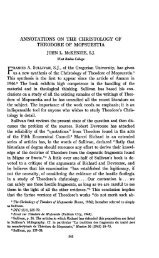episkopë and episkopos: the new testament evidence - Theological ...
episkopë and episkopos: the new testament evidence - Theological ...
episkopë and episkopos: the new testament evidence - Theological ...
Create successful ePaper yourself
Turn your PDF publications into a flip-book with our unique Google optimized e-Paper software.
326 THEOLOGICAL STUDIES<br />
<strong>the</strong>ological, stemming from <strong>the</strong> negative Hellenist attitude toward <strong>the</strong><br />
Temple (to be revealed in Stephen's sermon in Acts 7:47-51). The Twelve<br />
summon <strong>the</strong> common Christian assembly called "<strong>the</strong> multitude," 10 <strong>and</strong><br />
<strong>the</strong>y discuss <strong>the</strong> problem. According to Luke, <strong>the</strong>refore, by <strong>the</strong> mid-30's<br />
<strong>the</strong>re has already developed some structure for h<strong>and</strong>ling <strong>the</strong> common<br />
goods <strong>and</strong> also a deliberative assembly. But now more formal administration<br />
is needed to deal with a larger <strong>and</strong> less harmonious membership.<br />
There are three results from this scene: (1) Even to settle <strong>the</strong> dispute,<br />
<strong>the</strong> Twelve will not take over <strong>the</strong> distribution of community goods: "It is<br />
not right that we should give up preaching <strong>the</strong> word of God in order to<br />
serve tables." The fact that this is mentioned as a refused possibility<br />
means that <strong>the</strong> Twelve have not been taking care of food distribution.<br />
The decision of <strong>the</strong> Twelve to avoid becoming administrators of <strong>the</strong> local<br />
church confirms <strong>the</strong> statement made above that none of <strong>the</strong> Twelve is<br />
portrayed as a local church supervisor in NT times. (2) At <strong>the</strong> suggestion<br />
of Peter <strong>the</strong> Hellenists are given <strong>the</strong>ir own administrators, whose (seven)<br />
names are listed in Acts 6:5. The fact that this dispute has been centered<br />
on <strong>the</strong> distribution of food, described demeaningly as "waiting [diakoneiri\<br />
on table," has led to <strong>the</strong> erroneous designation of <strong>the</strong> Hellenist<br />
leaders as deacons, with <strong>the</strong> thought that <strong>the</strong>y were <strong>the</strong> second-level<br />
church administrators mentioned in Phil 1:1 <strong>and</strong> <strong>the</strong> Pastorals. However,<br />
<strong>the</strong>y seem to have been <strong>the</strong> top-level administrators for <strong>the</strong> Hellenist<br />
Christians, who not only supervised <strong>the</strong> distribution of <strong>the</strong> common goods<br />
but also preached <strong>and</strong> taught (as seen from Stephen's sermon in Acts 7<br />
<strong>and</strong> Philip's activity in Acts 8). 11 They are <strong>the</strong> first local church administrators<br />
encountered in <strong>the</strong> NT. We do not know if <strong>the</strong>y had a title, but<br />
aspects of <strong>the</strong> episkopë exercised by presbyter-bishops later in <strong>the</strong> first<br />
century resemble <strong>the</strong> tasks of <strong>the</strong> Hellenist leaders. (3) We are not told<br />
in Acts 6 that <strong>the</strong> Hebrew section of <strong>the</strong> Jerusalem community received<br />
a corresponding set of administrators, but subsequent information in Acts<br />
causes us to suspect that <strong>the</strong>y did. In Acts 11:30 we find a reference to a<br />
group of presbyters (presbyteroi) who are in charge of <strong>the</strong> common food<br />
of <strong>the</strong> Jerusalem/Judean church—a church from which <strong>the</strong> Hellenists<br />
have been driven out by Jewish persecution. 12<br />
The structure of <strong>the</strong> Jerusalem church needs special attention. The<br />
presbyters are consistently mentioned alongside <strong>the</strong> "apostles" (Acts 15:<br />
10 Plëthos in Acts 6:2,5 <strong>and</strong> 15:12,30 seems to be technical designation, related to Qumran<br />
:erminology where <strong>the</strong> community meeting was called a "Session of <strong>the</strong> Many" (1QS 6:8ff.).<br />
11 Although <strong>the</strong> Greek text is not certain, Acts 11:19-20 implies that Hellenists, scattered<br />
in <strong>the</strong> persecution that arose over Stephen, began <strong>the</strong> mission to <strong>the</strong> Gentiles (Hellenes).<br />
12 Acts 8:1 indicates <strong>the</strong> selective nature of <strong>the</strong> persecution of Christians: <strong>the</strong> apostles<br />
(<strong>and</strong> presumably <strong>the</strong> Hebrew Christians) were left untouched (since <strong>the</strong>y conducted no<br />
campaign against worship in <strong>the</strong> Temple), while <strong>the</strong> Hellenist Christians were scattered<br />
<strong>and</strong> pursued.
















